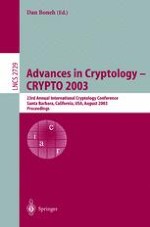2003 | OriginalPaper | Buchkapitel
Weak Key Authenticity and the Computational Completeness of Formal Encryption
verfasst von : Omer Horvitz, Virgil Gligor
Erschienen in: Advances in Cryptology - CRYPTO 2003
Verlag: Springer Berlin Heidelberg
Enthalten in: Professional Book Archive
Aktivieren Sie unsere intelligente Suche, um passende Fachinhalte oder Patente zu finden.
Wählen Sie Textabschnitte aus um mit Künstlicher Intelligenz passenden Patente zu finden. powered by
Markieren Sie Textabschnitte, um KI-gestützt weitere passende Inhalte zu finden. powered by
A significant effort has recently been made to rigorously relate the formal treatment of cryptography with the computational one. A first substantial step in this direction was taken by Abadi and Rogaway [AR02]. Considering a formal language that treats symmetric encryption, [AR02] show that an associated formal semantics is sound with respect to an associated computational semantics, under a particular, sufficient, condition on the computational encryption scheme. In this paper, we give a necessary and sufficient condition for completeness, tightly characterizing this aspect of the exposition. Our condition involves the ability to distinguish a ciphertext and the key it was encrypted with, from a ciphertext and a random key. It is shown to be strictly weaker than a previously suggested condition for completeness (confusion-freedom of Micciancio and Warinschi [MW02]), and should be of independent interest.
